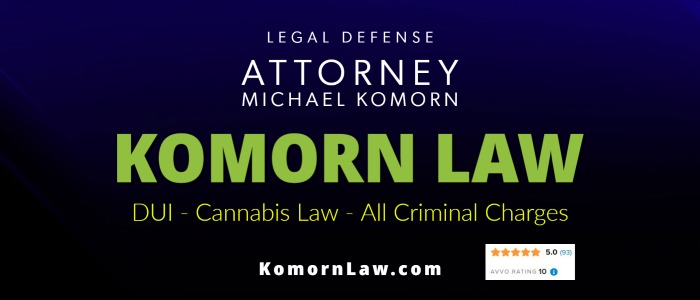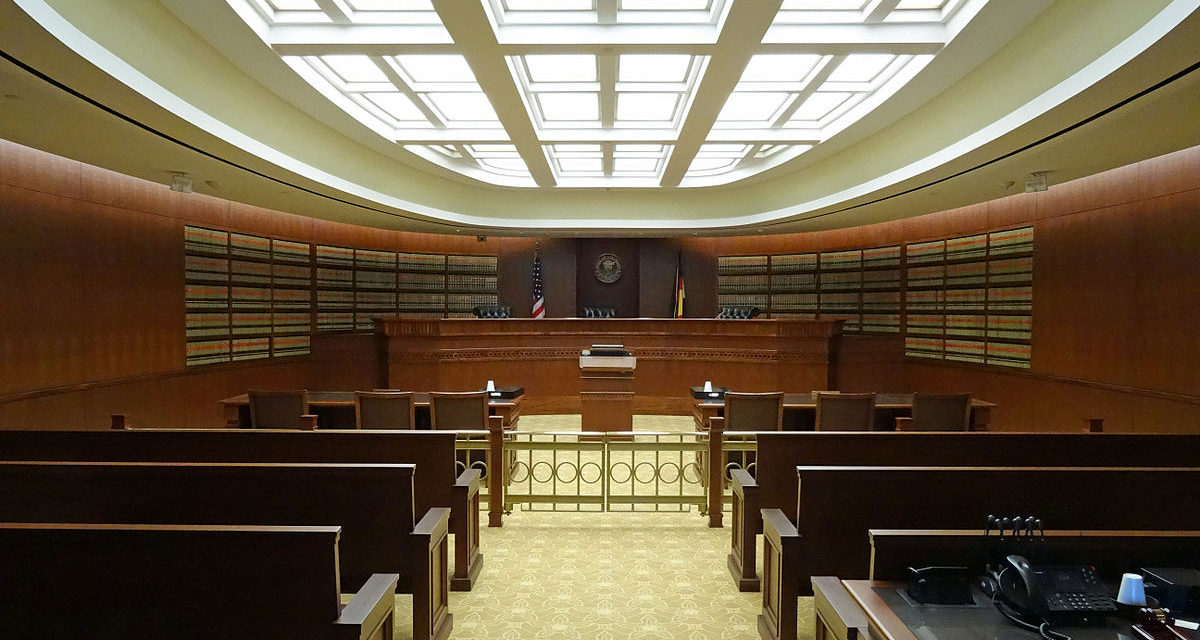[PDF]
Mark Toppen*
Abstract
On July 13, 2017, the Colorado Court of Appeals found that evidence obtained via conducting a dog sniff on a vehicle should have been suppressed, as a direct consequence of the state’s changing marijuana laws. Accordingly, the decision reversed the defendant’s prior conviction on two drug-related charges, remanding the case back to the district court for further review. More significantly, the case involves important Fourth Amendment considerations and sets new precedent for drug related searches in the state of Colorado. While the decision by the three-judge panel was unanimous in its holding, the varied reasoning asserted by each judge suggests that the issue may soon need to be considered by the Colorado Supreme Court.
Case Overview
In The People of the State of Colorado v. McKnight,[1] Kevin Keith McKnight was pulled over by Gonzales, a state police officer, for failure to signal when turning.[2] This stop came after Gonzales observed McKnight’s truck parked outside of a house, which had been the subject of a search weeks earlier that had turned up illegal drugs.[3] Consequently, Gonzales followed the truck and eventually pulled McKnight over.[4] Officer Gonzales then testified that upon pulling the vehicle over, he recognized McKnight’s passenger from previous “drug contacts” involving methamphetamine use.[5]He then requested a second officer, Folks, to come to the scene with his certified drug-sniffing dog, Kilo.[6] Kilo was trained to detect cocaine, heroin, ecstasy, methamphetamine, and marijuana by exhibiting certain behavior upon detecting the odor of one of these substances.[7] Kilo alerted, the Officers asked McKnight and his passenger to exit the truck, searched it, and found a glass pipe containing white residue.[8] Before trial, McKnight moved to suppress this evidence, asserting the officers violated his constitutional rights by conducting a dog sniff without reasonable suspicion.[9] The district court denied the motion, the case proceeded to trial, and a jury convicted McKnight of possession of a controlled substance and possession of drug paraphernalia.[10]
“Search” Jurisprudence Leading Up to McKnight
Before delving into the analysis of the McKnight Court in overturning the decision of the district court, it is important to place this case in proper context. To begin, the Fourth Amendment protects people against unreasonable searches and seizures,[11] and Colorado has similar protections in place under its state constitution.[12] Thus, at either the state or federal level, any evidence obtained subsequent to an illegal search is suppressed. The Supreme Court has held that “a police officer has probable cause to conduct a search when ‘the facts available to [him] would warrant a [person] of reasonable caution in the belief’ that contraband or evidence of a crime is present.’”[13] As a result, an individual has no legitimate privacy interest in possessing contraband, and so, police conduct which merely reveals the possession of contraband is permissible.[14] This is commonly referred to as a binary test. Therefore, incident to a lawful traffic stop, the use of a drug-sniffing dog does not constitute a “search,” as the dog is merely detecting whether or not contraband is present.[15] There is no “search,” and no corresponding reasonableness requirement. The Colorado Supreme Court has ruled similarly under the Colorado State Constitution,[16] while also explicitly holding in a subsequent case that merely walking a trained narcotic detection dog around a car does not implicate the protections of either the Fourth Amendment or Article II, section 7 of the state constitution.[17] As a result, the initial use of a drug-sniffing dog, incident to a lawful traffic stop, does not constitute a search under either federal or Colorado state law.
However, police officers must still have probable cause to actually search a vehicle. As the Supreme Court noted in Florida v. Harris:
The question—similar to every inquiry into probable cause–-is whether all the facts surrounding a dog’s alert, viewed through the lens of common sense, would make a reasonably prudent person think that a search would reveal contraband or evidence of a crime. A sniff is up to snuff when it meets that test.[18]
In other words, a police officer has probable cause to conduct a subsequent, physical search of the vehicle when the facts available to him would warrant a person of reasonable caution in the belief that contraband or evidence of a crime is present. The dog alert will suffice in establishing this probable cause. Moreover, the Harris Court made clear that, when determining whether an officer has probable cause to conduct a search, a totality of the circumstances analysis is required.[19] The Colorado courts also utilize a totality of the circumstances test, however, “reasonable suspicion” supplants “probable cause” as the state constitutional standard.[20] On its face, “reasonable suspicion” is a lower threshold than “probable cause.”[21]
McKnight Analysis
Returning to McKnight, the issue becomes more complicated. As the Colorado Court of Appeals noted, since 2012, it is no longer a violation of Colorado law for people who are at least twenty-one years old to possess up to one ounce of marijuana for personal use.[22] Accordingly, McKnight’s motion to suppress the evidence was premised on his belief that Kilo’s alert could reveal both something legal (an ounce or less of marijuana) or something illegal (illegal amounts of marijuana or another controlled substance).[23] This is premised on the fact that he would have a legitimate expectation of privacy in the former, but not the latter. A detection dog recognizes an odor, not a drug[24], and thus, a dog simply alerts when it has encountered one of the scents it has been trained to detect. Therefore, Judge Dailey reasoned that “it is no longer accurate to say, at least as a matter of state law, that an alert by a dog which can detect marijuana (but not specific amounts) can reveal only the presence of ‘contraband.’”[25] Interestingly, Judges Dailey and Berger also agreed with McKnight that the deployment of Kilo in the first instance constituted a “search” under Colorado’s State Constitution, first requiring reasonable suspicion of criminal activity, which did not exist.[26] In making this determination, they reasoned that (1) the fact that McKnight sat parked outside a house in which illegal drugs had been found seven weeks before and (2) that Officer Gonzales had knowledge that McKnight’s passenger had used methamphetamine in the past did not raise a reasonable suspicion that evidence of illegal activity would be found in the truck.[27] Finally, Judges J. Jones and Berger then agreed with McKnight that the dog’s alert, combined with the other circumstances, did not constitute the requisite probable cause to search the truck.[28] Consequently, the dog sniff was invalid, and the illegally obtained evidence should have been suppressed.[29] Kilo’s sniff was not up to snuff.
Some notable differences in the reasoning of the judges includes the following:
Judge Dailey
“No one could contend, for instance, that a federal agent’s use of dog to sniff a car for the presence of any amount of marijuana would constitute a ‘search’ under the Federal Constitution. And Fourth Amendment protections do not change simply because the actor using a drug-detection dog changes.”[30]
Judge J. Jones
Judge J. Jones, specially concurring, would have decided the issue on the grounds that the police officers lacked probable cause to search McKnight’s truck (as opposed to the decision that the use of the dog in the first instance constituted a “search,” to which he disagreed with Dailey and Berger).[31] Moreover, he stated, “I do not opine as to whether the change in Colorado’s marijuana laws affects the Fourth Amendment analysis; like the majority, my analysis is limited to the Colorado Constitution.”[32]
Judge Berger
Judge Berger, also specially concurring, did not think it was necessary to reach the probable cause determination,[33]though he still agreed it was absent even though it was a “very close question.”[34] In explaining how someone could have an enforceable expectation of privacy under state law while not under federal law, he stated, “The people of Colorado spoke clearly when they adopted Amendment 64. It is the duty of Colorado courts to give effect to that enactment. The Attorney General does not contend that Amendment 64 is displaced by the Supremacy Clause of the Federal Constitution.”[35] He therefore concluded:
[W]hile a person twenty-one years of age or older in possession of less than an ounce of marijuana does not have a reasonable expectation of privacy under federal law with respect to law enforcement activities of federal officers . . . he or she does have a reasonable expectation of privacy under state law with respect to law enforcement activities of state officers.[36]
Implications & Issues
It seems inevitable that the Colorado Supreme Court will eventually need weigh in on this particular issue. Although the McKnight court was unanimous in its conclusion, the asserted reasoning of each judge varied greatly. Collectively, their opinions raise several difficult issues.
First, under federal law, and within the context of a lawful traffic stop, the use of a drug-sniffing dog does not even implicate the Fourth Amendment, since no “search” has occurred.[37] Therefore, the issue of reasonableness becomes moot. Here, however, two judges decided that underthe state constitution, the deployment of the dog constituted a “search” since a dog sniff of a vehicle could infringe upon a legitimate expectation of privacy under state law[38] (i.e., the mere possible presence of a now legal activity—the possession of marijuana in legal quantities). Therefore, when juxtaposed against one another, this suggests that the determination for whether or not the use of a drug-sniffing dog in the first instance constitutes a “search” hinges upon which constitution is utilized. This is problematic and begs the question: what if a federal officer utilizes a drug-sniffing dog in the state of Colorado incident to a lawful traffic stop? While Judge Dailey asserted that “Fourth Amendment protections do not change simply because the actor using a drug-detection dog changes,”[39] Judge Berger appeared to disagree. He concluded that, to the contrary, “while a person twenty-one years of age or older in possession of less than an ounce of marijuana does not have a reasonable expectation of privacy under federal law with respect to law enforcement activities of federal officers . . . he or she does have a reasonable expectation of privacy under state law with respect to law enforcement activities of state officers.”[40] As these starkly different answers demonstrate, which constitution is utilized can dramatically impact the outcome, thereby creating uncertainty and potentially inequitable protection and treatment under the law.
Second, under federal law, a totality of the circumstances test is utilized to determine whether or not probable cause existed for a search, and the alert of a drug-sniffing dog will ordinarily constitute the requisite probable cause for such a search (i.e., one that is not “unreasonable” under the Fourth Amendment and can therefore be conducted without a warrant). Probable cause exists when, under all the facts surrounding a dog’s alert, and viewed through the lens of common sense, a reasonably prudent person would think that a search would reveal contraband or evidence of a crime.[41] Applying this standard, sufficient probable cause likely existed to search McKnight’s truck under Fourth Amendment jurisprudence. Kilo alerted to the presence of illegal drugs, since marijuana remains illegal under Federal law, thus constituting the requisite probable cause to search the vehicle. For the sake of argument, however, even assuming the alert in and of itself would be insufficient, probable cause may still have existed. For instance, the Supreme Court has also declared that probable cause to search may exist when the personal knowledge of the officer is sufficient “to warrant a man of reasonable caution in the belief that evidence of an offense is in the place to be searched.”[42]Officer Gonzales had personal knowledge of the fact that drugs had been recovered weeks earlier at the house McKnight remained parked outside of for fifteen minutes, and upon stopping McKnight, also recognized McKnight’s passenger from previous “drug contacts” involving methamphetamine.[43] It logically follows that it remains at least plausible that a reasonably prudent person would think a search of the truck would reveal evidence of a crime, even before Kilo’s arrival.
By contrast, although a totality of the circumstances test was also applied in the McKnight case, yet another subset of the three-judge panel determined that the dog’s alert, in combination with the other circumstances, did not give the police “reasonable suspicion” to search McKnight’s truck.[44] Again, the reasoning asserted for this conclusion was that Kilo’s alert, in and of itself, no longer was a reliable indicator of the presence of contraband under Colorado’s new marijuana laws.[45] Most notable here, however, is not that a totality of the circumstances test is utilized at both the federal and state level. Certainly, factual circumstances vary widely from one situation to the next, so when using a totality of the circumstances test, courts may permissibly differ in the outcome. Rather, the more interesting fact is that the McKnight majority actually concluded that under Colorado law, a “reasonable suspicion” standard is actually a prerequisite for a dog sniff to occur.[46] Thus, the totality of the circumstances test must be applied before the dog can even exit the police vehicle. Consequently, due to the timing component, a lower standard (reasonable suspicion) arguably creates a higher threshold. Again, this result remains at odds with Fourth Amendment jurisprudence. Arguably, it still remained plausible that under these circumstances, a reasonably prudent person would think a search of the truck would reveal evidence of a crime, even after excluding Kilo’s alert. As Judge Berger conceded, the probable cause question was “very close.”[47] Therefore, not only does the McKnight standard appear to conflict with Federal Fourth Amendment case law, but reasonable minds could differ on the actual application of the McKnight test in this case. This again creates uncertainty for uniform application of the law, in which the Colorado Supreme Court may soon need to weigh in.
Third, it is worth recognizing the Federal Supremacy issue that appeared to hang over the McKnight court. “I do not opine as to whether the change in Colorado’s marijuana laws affects the Fourth Amendment analysis; like the majority, my analysis is limited to the Colorado Constitution.”[48] “The Attorney General does not contend that Amendment 64 is displaced by the Supremacy Clause of the Federal Constitution.”[49] “No question has been raised in this case about whether Amendment 64 is preempted by federal law.”[50] Each of these statements were penned by a different McKnight judge. They seem to collectively suggest a certain level of discomfort with the apparent tension between federal and state “search” law in the aftermath of Colorado’s evolving marijuana laws. A reasonable reading of these statements would indicate that (1) had the state asserted that federal law supersedes Amendment 64 or (2) that Fourth Amendment jurisprudence supersedes Colorado Art. II, § 7 jurisprudence, these judges may have decided the case differently. Of course, asserting either one or both of these arguments would have placed the Colorado Attorney General in an untenable position. Still, the mere fact that three separate judges raised the supremacy issue suggests that there is at least some level of uneasiness in applying the current framework.
Conclusion
In deciding The People of the State of Colorado v. McKnight, the Colorado Court of Appeals weighed in on Colorado dog sniff and “search” jurisprudence amidst the changing landscape in state marijuana laws. And while the decision by the three-judge panel was unanimous in overturning the defendant’s conviction, the varied reasoning offered by the three-judge panel suggests that the issue may soon find its way to the Colorado Supreme Court. Greater clarity would prove beneficial to both persons in Colorado and for law enforcement personnel tasked with equitable enforcement of the law.
[*] Mark Toppen is an Associate Editor for the Denver Law Review and a 2018 J.D. Candidate at the University of Denver Sturm College of Law.
[*] Mark Toppen is an Associate Editor for the Denver Law Review and a 2018 J.D. Candidate at the University of Denver Sturm College of Law.
[1] 2017 COA 93.
[2] Id. at ¶ 7.
[3] Id.
[4] Id.
[5] Id. at ¶ 8
[6] Id. at ¶ 9.
[7] Id.
[8] Id. at ¶ 6, ¶ 10.
[9] Id. at ¶ 6.
[10] Id. at ¶ 5, ¶ 11.
[11] U.S. Const. amend. IV.
[12] See Colo. Const. art. II, § 7.
[13] Florida v. Harris, 568 U.S. 237, 243 (2013).
[14] United States v. Jacobsen, 466 U.S. 109, 123 (1984).
[15] Illinois v. Caballes, 543 U.S. 405, 409–10 (2005).
[16] See People v. Esparaza, 2012 CO 22, ¶ 6.
[17] People v. Mason, 2013 CO 32, ¶ 10.
[18] Harris, 568 U.S. at 237.
[19] Id.
[20] People v. McKnight, 2017 COA 93, ¶ 20–21.
[21] Id. at ¶ 21.
[22] Id. at ¶ 1 (citing Colo. Const. art. XVIII, § 16(3)(a) (Amendment 64)). Of course, possession of marijuana remains a crime under federal law, per 21 U.S.C. § 844(a) (2012).
[23] McKnight, 2017 COA 93 at ¶ 16.
[24] Harris, 568 U.S. at 246.
[25] McKnight, 2017 COA 93 at ¶ 17.
[26] Id. at ¶ 3.
[27] Id. at ¶ 23.
[28] Id. at ¶ 4.
[29] Id. at ¶ 24.
[30] Id. at ¶ 18, fn. 4.
[31] Id. at ¶ 33.
[32] Id. at ¶ 48, fn. 1.
[33] Id. at ¶ 27.
[34] Id.
[35] Id. at ¶ 29.
[36] Id. at ¶ 32.
[37] Illinois v. Caballes, 543 U.S. 405, 409–10 (2005).
[38] McKnight, 2017 COA 93 at ¶ 18.
[39] Id. at ¶ 18, fn. 4.
[40] Id. at ¶ 32.
[41] Florida v. Harris, 568 U.S. 237 (2013).
[42] Brinegar v. United States, 338 U.S. 160, 175–76 (1949).
[43] McKnight, 2017 COA 93 at ¶ 7–8.
[44] Id. at ¶ 4.
[45] Id. at ¶ 16.
[46] Id. at ¶ 19.
[47] Id. at ¶ 27.
[48] Id. at ¶ 48, fn. 1.
[49] Id. at ¶ 29.
[50] Id. at ¶ 17, fn. 3.









